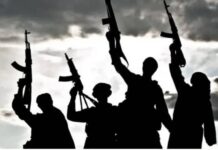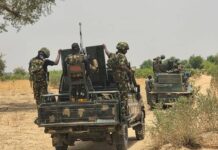It’s nine years now since Libyan leader, Muammar Gaddafi, was killed, but Nigeria and other African countries, are yet to get over the influx of arms and armed men resulting from the crisis.
President Muhammadu Buhari while speaking in London in 2018, blamed the former Libyan leader for the killings across Northcentral Nigeria saying the arms Gaddafi provided his supporters had filtered into Nigeria where they are being used to fuel killings across the Northcentral part of Nigeria.
He said, “The problem is even older than us, it has always been there, but now made worse by the influx of armed gunmen from the Sahel region into different parts of the West African sub-region.
“These gunmen were trained and armed by Muammar Gaddafi of Libya. When he was killed, the gunmen escaped with their arms. We encountered some of them fighting with Boko Haram.”
Imagine Libya, that is some 2,118 kilometres away and does not share a land border with Nigeria as it is blocked by Niger and Chad, having such a devastating effect on Nigeria’s security as a result of an internal crisis.
If weapons from a war that peaked some 9 years ago could still be a problem in Nigeria, one can imagine if the country had been closer and the effect when the crisis lingered.
The fact is, Nigeria’s porous borders coupled with the cultural affinity with neighbouring African countries makes it difficult to wedge war criminals and their weapons from permeating its shores.
Between the late 80 and early 90s, a fallout of one of the political crises in Chad led to an influx of rebels who turned their guns on hapless Nigerian villagers, killing and dispossessing them of their belongings.
The situation was so bad then that people abandoned their communities and ran for dear lives while travelling by road became a nightmare.
Chad is on the verge of having another presidential election in 2021 and if past experiences are anything to go by, Nigeria should indeed be worried.
The distance between Nigerian border communities and Chad is less than 2-hour drive.
Even before the processes for the elections are announced, the marks of the potential explosion are glaring.
And if history is anything to buy, the 2021 elections might not be different from the previous ones.
This is because, (1) the incumbent president, Marshal Idris Derby Itno would be contesting for a SIXTH (this is not a joke) term since coming to power in 1990.
(2) The forces bent on pushing him out just on account of the perception that he has overstayed are even more entrenched now.
(3) The ethnic card is being played up as the other ethnic groups want the Zaghawa out and are restive about having their chance at the presidency.
(4) The President has just been promoted a Marshall on account of the bloody nose he gave Boko Haram, killing over a thousand of them at a single operation he participated in March, which may heighten his feeling of invincibility.
(5) The country’s parliamentary election which was to hold since 2018 has consistently been postponed due to fear of crisis.
This is where Nigeria should be concerned.
If the Chadian presidential election does not hold due to any reason or is postponed like the parliamentary elections, the uprising that may go with it is enough to engender a conflict that may lead to the influx of refugees and other armed criminal running away from the crisis into Nigeria.
And if the election holds, the chances that it may not be crisis-free are there, given that Marshal Itno is even more desperate to rule till 2033 as the Chadian constitution permits him.
Both ways, Nigeria is likely to suffer.
The likely proliferation of arms and the attendant consequences are given Nigeria’s porous borders are what should concern us.
As it is, even without a direct threat from our neighbouring counties, Nigeria is having it tough containing the Boko Haram.
Nigeria can move ahead to use its influence at the AU to ensure that the elections in that country are well monitored to avoid an outbreak of violence.
The AU should learn from the Malian experience to explore the possibilities of averting conflict where it seems to be looming rather than wait for it to happen before taking action.
The experiences of the early 90s when Northeast Northeast Nigeria was being ravaged by the criminal activities of Chadian rebels are all too fresh.
Many people died through their acts of banditry and that was even when there was no Boko Haram or ISWAP.
One can only imagine the consequences if there’s a crisis in Chad and the rebels find their ways to Nigeria to swell the ranks of the insurgents.
The earlier we look in that direction would be the better for us as Nigeria cannot afford another direct influx of rebels on its soil.
Andrew Agbese, a former politics editor of Daily Trust, contributed this piece from Kaduna.
Follow the Neptune Prime channel on WhatsApp:
Do you have breaking news, interview request, opinion, suggestion, or want your event covered? Email us at neptuneprime2233@gmail.com





